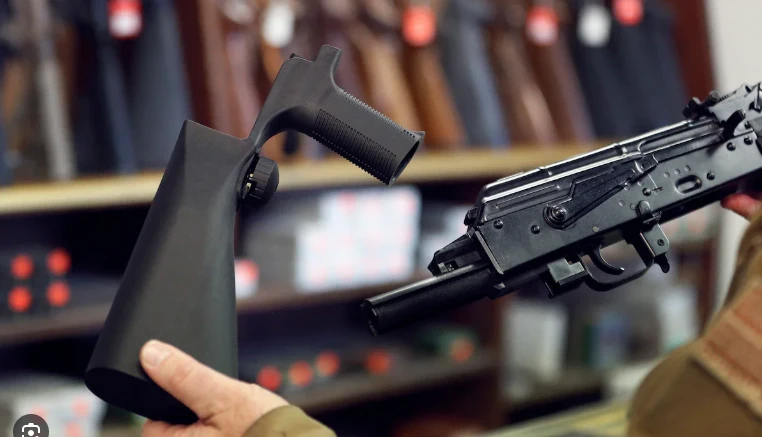US Supreme Court strikes down ban on gun 'bump stocks'

Stay tuned with 24 News HD Android App

The US Supreme Court ruled on Friday that a ban introduced by ex-president Donald Trump's administration on bump stocks -- devices which allow semi-automatic rifles to fire like a machine gun -- is unconstitutional.
The case stems from the worst mass shooting in US history, in October 2017, when a man fired on a crowd attending an outdoor music concert in Las Vegas, killing 58 people and wounding around 500.
Most of his 22 guns were equipped with bump stocks, allowing them to fire as many as nine bullets a second.
The court voted along ideological lines, 6-3 in favor of the conservative justices, that the Trump administration did not follow the law after the shooting in extending a ban on machine guns to include bump stocks.
"This case asks whether a bump stock -- an accessory for a semiautomatic rifle that allows the shooter to rapidly reengage the trigger (and therefore achieve a high rate of fire) -- converts the rifle into a 'machinegun,'" said Justice Clarence Thomas, writing the opinion for the majority.
"We hold that it does not."
The Trump campaign -- keen to play up the pro-gun credentials of the last administration, despite it introducing the bump stock ban -- said the court's decision "should be respected."
Leading lobby group the National Rifle Association (NRA) welcomed the ruling as having "properly restrained executive branch agencies to their role of enforcing, and not making, the law."
But it sparked howls of outrage from gun control activists and Democrats, with President Joe Biden's reelection campaign denouncing the court for prioritizing the gun lobby over "the safety of our kids."
"Weapons of war have no place on the streets of America, but Trump's Supreme Court justices have decided the gun lobby is more important than the safety of our kids and our communities," campaign spokesman Michael Tyler said in a statement.
Esther Sanchez-Gomez of gun control group Giffords blasted the conservative justices for having "sided with the gun lobby instead of the safety of the American people," pointing to polling showing more than eight in 10 Americans favor a ban.
- 'Quacks like a duck' -
The government first acted on the issue in 2018, following another mass shooting at a Florida high school which left 17 people dead, when the Justice Department under Trump moved to declare the detachable devices illegal.
In December of that year, the Bureau of Alcohol, Tobacco, Firearms and Explosives (ATF) revised its regulations on bump stocks, declaring that they fall under a 1934 law passed by Congress banning machine guns.
Brian Fletcher, deputy solicitor general in President Joe Biden's Justice Department, told the court when it heard oral arguments in February that bump stocks allow a user to "empty a 100-round magazine like the ones used in the Las Vegas shooting in about 10 seconds."
"Those weapons do exactly what Congress meant to prohibit when it enacted the prohibition on machine guns," Fletcher said.
But lawyers for Michael Cargill, a gun seller from Texas, challenged the move claiming the ATF had overstepped its bounds in classifying bump stocks with machine guns.
Oral arguments focused on the technical definition of a machine gun in the 1934 law, which was passed during the Prohibition era, well before the invention of the bump stock.
Thomas said in his opinion the law defines a machine gun strictly as a weapon capable of firing "automatically more than one shot... by a single function of the trigger."
But the ruling prompted a robust dissent from liberal Justice Sonia Sotomayor, who said the court's definition of "machine gun" was at odds with the ordinary meaning.
"When I see a bird that walks like a duck, swims like a duck, and quacks like a duck, I call that bird a duck."
